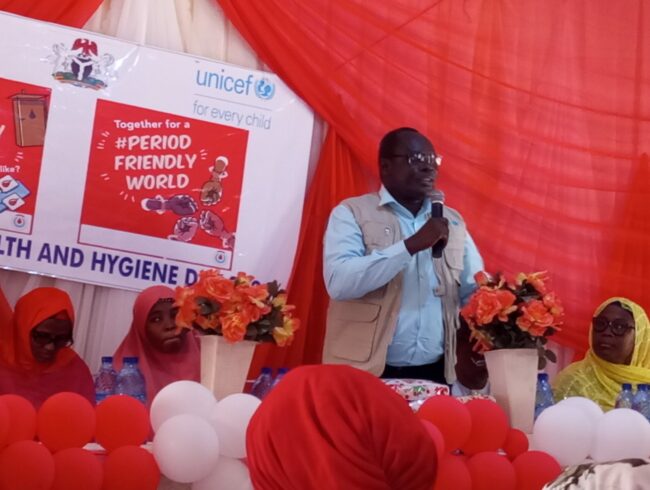United Nations Children Fund (UNICEF) in collaboration with other stakeholders including the Nigeria Union of Women Journalists (NAWOJ), has advocated for access to menstrual health and hygiene education in schools in Sokoto state.
UNICEF Chief of Field Office (CFO) Sokoto state, Mr Michael Juma, stated this at Menstrual Health and Hygiene Day tagged ” Together for a Period-Friendly World ” organized by UNICEF and NAWOJ on Tuesday in Sokoto.
He said access to menstrual hygiene products is crucial to healthy living, well-being, and dignity of all women and girls in society.
He said educating people on menstrual health and hygiene is significant to adopting proper menstrual care practices.
The officer underscored the importance of increased awareness especially among girls that were starting their periods for healthy well-being and prevention of infections.
“Beyond advocacy, there is a need for provision of items to adolescent girls in schools, clear misconceptions, stigma and taboos surrounding menstruation to ensure dignity, integrity and respect for women and adolescents,” he said.
In her remarks, NAWOJ Chairperson in Sokoto state, Hajia Rakiya Muhammad, said the partnership was to enhance awareness as well as address myths and misconceptions among women and girls in society.
Muhammad said health educators and education experts were engaged to educate students on good sanitary practices, body hygiene and prevention against infections caused by improper menstrual hygiene.
She assured to widen the campaign to reach hard-reach areas and schools across the state in recognition of the importance of the exercise.
“I believe that empowering women to take charge of their menstrual health is not just essential, but transformative.
“When women have the tools and knowledge to manage their menstruation confidently and hygienically, they gain a sense of empowerment and dignity that transcends beyond their physical well-being.
“We envision a world where young women and girls are well-guided, inspired, educated, and empowered,” Muhammad said.
An educationist, Hajia Fatima Bello, educated the students on body growth and development up to the period of puberty, symptoms of menstruation, proper management and poor handling that leads to dangerous infections.
Bello emphasised the need for parents to ensure proper guidance of girls as well as provide sanitary pads and other needs to girls to avoid life-threatening diseases.
Malam Zayyana Shehu, UNICEF Officer in charge of HVP vaccination dwelled on the importance of women obtaining the free vaccine in their lifetime in order to prevent cervical cancer.
Asabe Hassan-Mshelbara UNICEF WASH officer in field office in Sokoto, dwelled on the concept of reusable sanitary pads as a sustainable and cost-effective solution to the menstrual period.
No fewer than eight schools participated in literary on menstrual issues competitions and winners received awards and the event featured the distribution of reusable sanitary pads to students.
ALSO READ THESE TOP STORIES FROM NIGERIAN TRIBUNE
